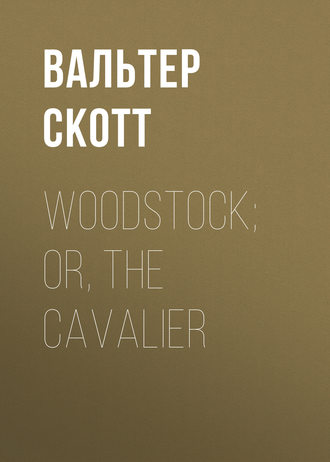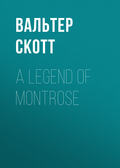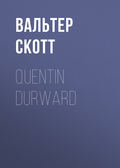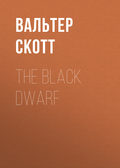
Вальтер Скотт
Woodstock; or, the Cavalier
"And if they do sally, is there one of my Ironsides who fears fire or steel less than myself?" said the General. "Let ten of the most determined men follow us, two with halberts, two with petronels, the others with pistols – Let all their arms be loaded, and fire without hesitation, if there is any attempt to resist or to sally forth – Let Corporal Humgudgeon be with them, and do thou remain here, and watch against escape, as thou wouldst watch for thy salvation."
The General then struck at the door with the hilt of his sword – at first with a single blow or two, then with a reverberation of strokes that made the ancient building ring again. This noisy summons was repeated once or twice without producing the least effect.
"What can this mean?" said Cromwell; "they cannot surely have fled, and left the house empty."
"No," replied Pearson, "I will ensure you against that; but your Excellency strikes so fiercely, you allow no time for an answer. Hark! I hear the baying of a hound, and the voice of a man who is quieting him – Shall we break in at once, or hold parley?"
"I will speak to them first," said Cromwell. – "Hollo! who is within there?"
"Who is it enquires?" answered Sir Henry Lee from the interior; "or what want you here at this dead hour?"
"We come by warrant of the Commonwealth of England," said the General.
"I must see your warrant ere I undo either bolt or latch," replied the knight; "we are enough of us to make good the castle: neither I nor my fellows will deliver it up but upon good quarter and conditions; and we will not treat for these save in fair daylight."
"Since you will not yield to our right, you must try our might," replied Cromwell. "Look to yourselves within; the door will be in the midst of you in five minutes."
"Look to yourselves without," replied the stout-hearted Sir Henry; "we will pour our shot upon you, if you attempt the least violence."
But, alas! while he assumed this bold language, his whole garrison consisted of two poor terrified women; for his son, in conformity with the plan which they had fixed upon, had withdrawn from the hall into the secret recesses of the palace.
"What can they be doing now, sir?" said Phoebe, hearing a noise as it were of a carpenter turning screw-nails, mixed with a low buzz of men talking.
"They are fixing a petard," said the knight, with great composure. "I have noted thee for a clever wench, Phoebe, and I will explain it to thee: 'Tis a metal pot, shaped much like one of the roguish knaves' own sugarloaf hats, supposing it had narrower brims – it is charged with some few pounds of fine gunpowder. Then" —
"Gracious! we shall be all blown up!" exclaimed Phoebe, – the word gunpowder being the only one which she understood in the knight's description.
"Not a bit, foolish girl. Pack old Dame Jellicot into the embrasure of yonder window," said the knight, "on that side of the door, and we will ensconce ourselves on this, and we shall have time to finish my explanation, for they have bungling engineers. We had a clever French fellow at Newark would have done the job in the firing of a pistol."
They had scarce got into the place of security when the knight proceeded with his description. – "The petard being formed, as I tell you, is secured with a thick and strong piece of plank, termed the madrier, and the whole being suspended, or rather secured against the gate to be forced – But thou mindest me not?"
"How can I, Sir Henry," she said, "within reach of such a thing as you speak of? – O Lord! I shall go mad with very terror – we shall be crushed – blown up – in a few minutes!"
"We are secure from the explosion," replied the knight, gravely, "which will operate chiefly in a forward direction into the middle of the chamber; and from any fragments that may fly laterally, we are sufficiently guarded by this deep embrasure."
"But they will slay us when they enter," said Phoebe.
"They will give thee fair quarter, wench," said Sir Henry; "and if I do not bestow a brace of balls on that rogue engineer, it is because I would not incur the penalty inflicted by martial law, which condemns to the edge of the sword all persons who attempt to defend an untenable post. Not that I think the rigour of the law could reach Dame Jellicot or thyself, Phoebe, considering that you carry no arms. If Alice had been here she might indeed have done somewhat, for she can use a birding-piece."
Phoebe might have appealed to her own deeds of that day, as more allied to feats of mêlée and battle, than any which her young lady ever acted; but she was in an agony of inexpressible terror, expecting, from the knight's account of the petard, some dreadful catastrophe, of what nature she did not justly understand, notwithstanding his liberal communication on the subject.
"They are strangely awkward at it," said Sir Henry; "little Boutirlin would have blown the house up before now. – Ah! he is a fellow would take the earth like a rabbit – if he had been here, never may I stir but he would have countermined them ere now, and
– ''Tis sport to have the engineer
Hoist with his own petard.'
as our immortal Shakspeare has it."
"Oh, Lord, the poor mad old gentleman," thought Phoebe – "Oh, sir, had you not better leave alone playbooks, and think of your end?" uttered she aloud, in sheer terror and vexation of spirit.
"If I had not made up my mind to that many days since," answered the knight, "I had not now met this hour with a free bosom —
'As gentle and as jocund as to rest,
Go I to death – truth hath a quiet breast.'"
As he spoke, a broad glare of light flashed from without, through the windows of the hall, and betwixt the strong iron stanchions with which they were secured – a broad discoloured light it was, which shed a red and dusky illumination on the old armour and weapons, as if it had been the reflection of a conflagration. Phoebe screamed aloud, and, forgetful of reverence in the moment of passion, clung close to the knight's cloak and arm, while Dame Jellicot, from her solitary niche, having the use of her eyes, though bereft of her hearing, yelled like an owl when the moon breaks out suddenly.
"Take care, good Phoebe," said the knight; "you will prevent my using my weapon if you hang upon me thus. – The bungling fools cannot fix their petard without the use of torches! Now let me take the advantage of this interval. – Remember what I told thee, and how to put off time."
"Oh, Lord – ay, sir," said Phoebe, "I will say any thing, Oh, Lord, that it were but over! – Ah! ah!" – (two prolonged screams) – "I hear something hissing like a serpent."
"It is the fusee, as we martialists call it," replied the knight; "that is, Phoebe, the match which fires the petard, and which is longer or shorter, according to the distance."
Here the knight's discourse was cut short by a dreadful explosion, which, as he had foretold, shattered the door, strong as it was, to pieces, and brought down the glass clattering from the windows with all the painted heroes and heroines, who had been recorded on that fragile place of memory for centuries. The women shrieked incessantly, and were answered by the bellowing of Bevis, though shut up at a distance from the scene of action. The knight, shaking Phoebe from him with difficulty, advanced into the hall to meet those who rushed in, with torches lighted and weapons prepared.
"Death to all who resist – life to those who surrender!" exclaimed Cromwell, stamping with his foot. "Who commands this garrison?"
"Sir Henry Lee of Ditchley," answered the old knight, stepping forward; "who, having no other garrison than two weak women, is compelled to submit to what he would willingly have resisted."
"Disarm the inveterate and malignant rebel," cried Oliver. "Art thou not ashamed, sir, to detain me before the door of a house which you had no force to defend? Wearest thou so white a beard, and knowest thou not, that to refuse surrendering an indefensible post, by the martial law, deserves hanging?"
"My beard and I," said Sir Henry, "have settled that matter between us, and agree right cordially. It is better to run the risk of being hanged, like honest men, than to give up our trust like cowards and traitors."
"Ha! say'st thou?" said Cromwell; "thou hast powerful motives, I doubt not, for running thy head into a noose. But I will speak with thee by and by. – Ho! Pearson, Gilbert Pearson, take this scroll – Take the elder woman with thee – Let her guide you to the various places therein mentioned – Search every room therein set down, and arrest, or slay upon the slightest resistance, whomsoever you find there. Then note those places marked as commanding points for cutting off intercourse through the mansion – the landing-places of the great staircase, the great gallery, and so forth. Use the woman civilly. The plan annexed to the scroll will point out the posts, even if she prove stupid or refractory. Meanwhile, the corporal, with a party, will bring the old man and the girl there to some apartment – the parlour, I think, called Victor Lee's, will do as well as another. – We will then be out of this stifling smell of gunpowder."
So saying, and without requiring any farther assistance or guidance, he walked towards the apartment he had named. Sir Henry had his own feelings, when he saw the unhesitating decision with which the General led the way, and which seemed to intimate a more complete acquaintance with the various localities of Woodstock than was consistent with his own present design, to engage the Commonwealth party in a fruitless search through the intricacies of the Lodge.
"I will now ask thee a few questions, old man," said the General, when they had arrived in the room; "and I warn thee, that hope of pardon for thy many and persevering efforts against the Commonwealth, can be no otherwise merited than by the most direct answers to the questions I am about to ask."
Sir Henry bowed. He would have spoken, but he felt his temper rising high, and became afraid it might be exhausted before the part he had settled to play, in order to afford the King time for his escape, should be brought to an end.
"What household have you had here, Sir Henry Lee, within these few days – what guests – what visitors? We know that your means of house-keeping are not so profuse as usual, so the catalogue cannot be burdensome to your memory."
"Far from it," replied the knight, with unusual command of temper, "my daughter, and latterly my son, have been my guests; and I have had these females, and one Joceline Joliffe, to attend upon us."
"I do not ask after the regular members of your household, but after those who have been within your gates, either as guests, or as malignant fugitives taking shelter."
"There may have been more of both kinds, sir, than I, if it please your valour, am able to answer for," replied the knight. "I remember my kinsman Everard was here one morning – Also, I bethink me, a follower of his, called Wildrake."
"Did you not also receive a young cavalier, called Louis Garnegey?" said Cromwell.
"I remember no such name, were I to hang for it," said the knight. "Kerneguy, or some such word," said the General; "we will not quarrel for a sound."
"A Scotch lad, called Louis Kerneguy, was a guest of mine," said Sir Henry, "and left me this morning for Dorsetshire."
"So late!" exclaimed Cromwell, stamping with his foot – "How fate contrives to baffle us, even when she seems most favourable! – What direction did he take, old man?" continued Cromwell – "what horse did he ride – who went with him?"
"My son went with him," replied the knight; "he brought him here as the son of a Scottish lord. – I pray you, sir, to be finished with these questions; for although I owe thee, as Will Shakspeare says, Respect for thy great place, and let the devil Be sometimes honoured for his burning throne, – yet I feel my patience wearing thin."
Cromwell here whispered to the corporal, who in turn uttered orders to two soldiers, who left the room. "Place the knight aside; we will now examine the servant damsel," said the General. – "Dost them know," said he to Phoebe, "of the presence of one Louis Kerneguy, calling himself a Scotch page, who came here a few days since?"
"Surely, sir," she replied, "I cannot easily forget him; and I warrant no well-looking wench that comes into his way will be like to forget him either."
"Aha," said Cromwell, "sayst thou so? truly I believe the woman will prove the truer witness. – When did he leave this house?"
"Nay, I know nothing of his movements, not I," said Phoebe; "I am only glad to keep out of his way. But if he have actually gone hence, I am sure he was here some two hours since, for he crossed me in the lower passage, between the hall and the kitchen."
"How did you know it was he?" demanded Cromwell.
"By a rude enough token," said Phoebe. – "La, sir, you do ask such questions!" she added, hanging down her head.
Humgudgeon here interfered, taking upon himself the freedom of a co-adjutor. "Verily," he said, "if what the damsel is called to speak upon hath aught unseemly, I crave your Excellency's permission to withdraw, not desiring that my nightly meditations may be disturbed with tales of such a nature."
"Nay, your honour," said Phoebe, "I scorn the old man's words, in the way of seemliness or unseemliness either. Master Louis did but snatch a kiss, that is the truth of it, if it must be told."
Here Humgudgeon groaned deeply, while his Excellency avoided laughing with some difficulty. "Thou hast given excellent tokens, Phoebe," he said; "and if they be true, as I think they seem to be, thou shalt not lack thy reward. – And here comes our spy from the stables."
"There are not the least signs," said the trooper, "that horses have been in the stables for a month – there is no litter in the stalls, no hay in the racks, the corn-bins are empty, and the mangers are full of cobwebs."
"Ay, ay," said the old knight, "I have seen when I kept twenty good horses in these stalls, with many a groom and stable-boy to attend them."
"In the meanwhile," said Cromwell, "their present state tells little for the truth of your own story, that there were horses to-day, on which this Kerneguy and your son fled from justice."
"I did not say that the horses were kept there," said the knight. "I have horses and stables elsewhere."
"Fie, fie, for shame, for shame!" said the General; "can a white-bearded man, I ask it once more, be a false witness?"
"Faith, sir," said Sir Henry Lee, "it is a thriving trade, and I wonder not that you who live on it are so severe in prosecuting interlopers. But it is the times, and those who rule the times, that make grey-beards deceivers."
"Thou art facetious friend, as well as daring in thy malignity," said Cromwell; "but credit me, I will cry quittance with you ere I am done.
Whereunto lead these doors?"
"To bedrooms," answered the knight.
"Bedrooms! only to bedrooms?" said the Republican General, in a voice which indicated such was the internal occupation of his thoughts, that he had not fully understood the answer.
"Lord, sir," said the knight, "why should you make it so strange? I say these doors lead to bedrooms – to places where honest men sleep, and rogues lie awake."
"You are running up a farther account, Sir Henry," said the General; "but we will balance it once and for all."
During the whole of the scene, Cromwell, whatever might be the internal uncertainty of his mind, maintained the most strict temperance in language and manner, just as if he had no farther interest in what was passing, than as a military man employed in discharging the duty enjoined him by his superiors. But the restraint upon his passion was but "The torrent's smoothness ere it dash below."
[Footnote:
But mortal pleasure, what art thou in truth?
The torrent's smoothness ere it dash, below.
CAMPBELL'S Gertrude of Wyoming.]
The course of his resolution was hurried on even more forcibly, because no violence of expression attended or announced its current. He threw himself into a chair, with a countenance that indicated no indecision of mind, but a determination which awaited only the signal for action. Meanwhile the knight, as if resolved in nothing to forego the privileges of his rank and place, sat himself down in turn, and putting on his hat, which lay on a table, regarded the General with a calm look of fearless indifference. The soldiers stood around, some holding the torches, which illuminated the apartment with a lurid and sombre glare of light, the others resting upon their weapons. Phoebe, with her hands folded, her eyes turned upwards till the pupils were scarce visible, and every shade of colour banished from her ruddy cheek, stood like one in immediate apprehension of the sentence of death being pronounced, and instant execution commanded.
Heavy steps were at last heard, and Pearson and some of the soldiers returned. This seemed to be what Cromwell waited for. He started up, and asked hastily, "Any news, Pearson? any prisoners – any malignants slain in thy defence?"
"None, so please your Excellency," said the officer.
"And are thy sentinels all carefully placed, as Tomkins' scroll gave direction, and with fitting orders?"
"With the most deliberate care," said Pearson.
"Art thou very sure," said Cromwell, pulling him a little to one side, "that this is all well and duly cared for? Bethink thee, that when we engage ourselves in the private communications, all will be lost should the party we look for have the means of dodging us by an escape into the more open rooms, and from thence perhaps into the forest."
"My Lord-General," answered Pearson, "if placing the guards on the places pointed out in this scroll be sufficient, with the strictest orders to stop, and, if necessary, to stab or shoot, whoever crosses their post, such orders are given to men who will not fail to execute them. If more is necessary, your Excellency has only to speak."
"No – no – no, Pearson," said the General, "thou hast done well. – This night over, and let it end but as we hope, thy reward shall not be wanting. – And now to business. – Sir Henry Lee, undo me the secret spring of yonder picture of your ancestor. Nay, spare yourself the trouble and guilt of falsehood or equivocation, and, I say, undo me that spring presently."
"When I acknowledge you for my master, and wear your livery, I may obey your commands," answered the knight; "even then I would need first to understand them."
"Wench," said Cromwell, addressing Phoebe, "go thou undo the spring – you could do it fast enough when you aided at the gambols of the demons of Woodstock, and terrified even Mark Everard, who, I judged, had more sense."
"Oh Lord, sir, what shall I do?" said Phoebe, looking to the knight; "they know all about it. What shall I do?"
"For thy life, hold out to the last, wench! Every minute is worth a million."
"Ha! heard you that, Pearson?" said Cromwell to the officer; then, stamping with his foot, he added, "Undo the spring, or I will else use levers and wrenching-irons – Or, ha! another petard were well bestowed – Call the engineer."
"O Lord, sir," cried Phoebe, "I shall never live another peter – I will open the spring."
"Do as thou wilt," said Sir Henry; "it shall profit them but little."
Whether from real agitation, or from a desire to gain time, Phoebe was some minutes ere she could get the spring to open; it was indeed secured with art, and the machinery on which it acted was concealed in the frame of the portrait. The whole, when fastened, appeared quite motionless, and betrayed, as when examined by Colonel Everard, no external mark of its being possible to remove it. It was now withdrawn, however, and showed a narrow recess, with steps which ascended on one side into the thickness of the wall. Cromwell was now like a greyhound slipped from the leash with the prey in full view. – "Up," he cried, "Pearson, thou art swifter than I – Up thou next, corporal." With more agility than could have been expected from his person or years, which were past the meridian of life, and exclaiming, "Before, those with the torches!" he followed the party, like an eager huntsman in the rear of his hounds, to encourage at once and direct them, as they penetrated into the labyrinth described by Dr. Rochecliffe in the "Wonders of Woodstock."







